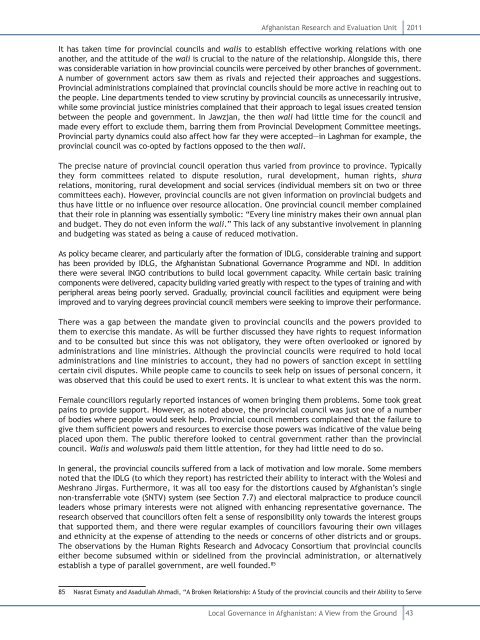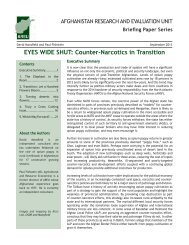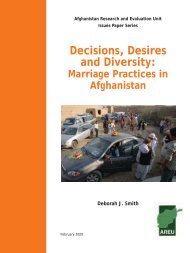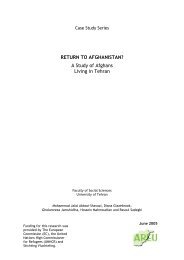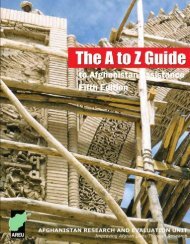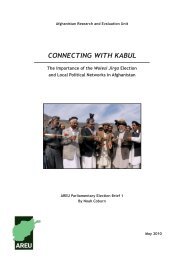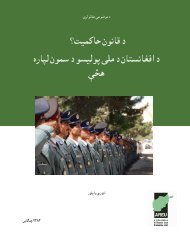Local Governance in Afghanistan: A View from the Ground
Local Governance in Afghanistan: A View from the Ground
Local Governance in Afghanistan: A View from the Ground
- No tags were found...
You also want an ePaper? Increase the reach of your titles
YUMPU automatically turns print PDFs into web optimized ePapers that Google loves.
<strong>Afghanistan</strong> Research and Evaluation Unit<br />
2011<br />
It has taken time for prov<strong>in</strong>cial councils and walis to establish effective work<strong>in</strong>g relations with one<br />
ano<strong>the</strong>r, and <strong>the</strong> attitude of <strong>the</strong> wali is crucial to <strong>the</strong> nature of <strong>the</strong> relationship. Alongside this, <strong>the</strong>re<br />
was considerable variation <strong>in</strong> how prov<strong>in</strong>cial councils were perceived by o<strong>the</strong>r branches of government.<br />
A number of government actors saw <strong>the</strong>m as rivals and rejected <strong>the</strong>ir approaches and suggestions.<br />
Prov<strong>in</strong>cial adm<strong>in</strong>istrations compla<strong>in</strong>ed that prov<strong>in</strong>cial councils should be more active <strong>in</strong> reach<strong>in</strong>g out to<br />
<strong>the</strong> people. L<strong>in</strong>e departments tended to view scrut<strong>in</strong>y by prov<strong>in</strong>cial councils as unnecessarily <strong>in</strong>trusive,<br />
while some prov<strong>in</strong>cial justice m<strong>in</strong>istries compla<strong>in</strong>ed that <strong>the</strong>ir approach to legal issues created tension<br />
between <strong>the</strong> people and government. In Jawzjan, <strong>the</strong> <strong>the</strong>n wali had little time for <strong>the</strong> council and<br />
made every effort to exclude <strong>the</strong>m, barr<strong>in</strong>g <strong>the</strong>m <strong>from</strong> Prov<strong>in</strong>cial Development Committee meet<strong>in</strong>gs.<br />
Prov<strong>in</strong>cial party dynamics could also affect how far <strong>the</strong>y were accepted—<strong>in</strong> Laghman for example, <strong>the</strong><br />
prov<strong>in</strong>cial council was co-opted by factions opposed to <strong>the</strong> <strong>the</strong>n wali.<br />
The precise nature of prov<strong>in</strong>cial council operation thus varied <strong>from</strong> prov<strong>in</strong>ce to prov<strong>in</strong>ce. Typically<br />
<strong>the</strong>y form committees related to dispute resolution, rural development, human rights, shura<br />
relations, monitor<strong>in</strong>g, rural development and social services (<strong>in</strong>dividual members sit on two or three<br />
committees each). However, prov<strong>in</strong>cial councils are not given <strong>in</strong>formation on prov<strong>in</strong>cial budgets and<br />
thus have little or no <strong>in</strong>fluence over resource allocation. One prov<strong>in</strong>cial council member compla<strong>in</strong>ed<br />
that <strong>the</strong>ir role <strong>in</strong> plann<strong>in</strong>g was essentially symbolic: “Every l<strong>in</strong>e m<strong>in</strong>istry makes <strong>the</strong>ir own annual plan<br />
and budget. They do not even <strong>in</strong>form <strong>the</strong> wali.” This lack of any substantive <strong>in</strong>volvement <strong>in</strong> plann<strong>in</strong>g<br />
and budget<strong>in</strong>g was stated as be<strong>in</strong>g a cause of reduced motivation.<br />
As policy became clearer, and particularly after <strong>the</strong> formation of IDLG, considerable tra<strong>in</strong><strong>in</strong>g and support<br />
has been provided by IDLG, <strong>the</strong> <strong>Afghanistan</strong> Subnational <strong>Governance</strong> Programme and NDI. In addition<br />
<strong>the</strong>re were several INGO contributions to build local government capacity. While certa<strong>in</strong> basic tra<strong>in</strong><strong>in</strong>g<br />
components were delivered, capacity build<strong>in</strong>g varied greatly with respect to <strong>the</strong> types of tra<strong>in</strong><strong>in</strong>g and with<br />
peripheral areas be<strong>in</strong>g poorly served. Gradually, prov<strong>in</strong>cial council facilities and equipment were be<strong>in</strong>g<br />
improved and to vary<strong>in</strong>g degrees prov<strong>in</strong>cial council members were seek<strong>in</strong>g to improve <strong>the</strong>ir performance.<br />
There was a gap between <strong>the</strong> mandate given to prov<strong>in</strong>cial councils and <strong>the</strong> powers provided to<br />
<strong>the</strong>m to exercise this mandate. As will be fur<strong>the</strong>r discussed <strong>the</strong>y have rights to request <strong>in</strong>formation<br />
and to be consulted but s<strong>in</strong>ce this was not obligatory, <strong>the</strong>y were often overlooked or ignored by<br />
adm<strong>in</strong>istrations and l<strong>in</strong>e m<strong>in</strong>istries. Although <strong>the</strong> prov<strong>in</strong>cial councils were required to hold local<br />
adm<strong>in</strong>istrations and l<strong>in</strong>e m<strong>in</strong>istries to account, <strong>the</strong>y had no powers of sanction except <strong>in</strong> settl<strong>in</strong>g<br />
certa<strong>in</strong> civil disputes. While people came to councils to seek help on issues of personal concern, it<br />
was observed that this could be used to exert rents. It is unclear to what extent this was <strong>the</strong> norm.<br />
Female councillors regularly reported <strong>in</strong>stances of women br<strong>in</strong>g<strong>in</strong>g <strong>the</strong>m problems. Some took great<br />
pa<strong>in</strong>s to provide support. However, as noted above, <strong>the</strong> prov<strong>in</strong>cial council was just one of a number<br />
of bodies where people would seek help. Prov<strong>in</strong>cial council members compla<strong>in</strong>ed that <strong>the</strong> failure to<br />
give <strong>the</strong>m sufficient powers and resources to exercise those powers was <strong>in</strong>dicative of <strong>the</strong> value be<strong>in</strong>g<br />
placed upon <strong>the</strong>m. The public <strong>the</strong>refore looked to central government ra<strong>the</strong>r than <strong>the</strong> prov<strong>in</strong>cial<br />
council. Walis and woluswals paid <strong>the</strong>m little attention, for <strong>the</strong>y had little need to do so.<br />
In general, <strong>the</strong> prov<strong>in</strong>cial councils suffered <strong>from</strong> a lack of motivation and low morale. Some members<br />
noted that <strong>the</strong> IDLG (to which <strong>the</strong>y report) has restricted <strong>the</strong>ir ability to <strong>in</strong>teract with <strong>the</strong> Wolesi and<br />
Meshrano Jirgas. Fur<strong>the</strong>rmore, it was all too easy for <strong>the</strong> distortions caused by <strong>Afghanistan</strong>’s s<strong>in</strong>gle<br />
non-transferrable vote (SNTV) system (see Section 7.7) and electoral malpractice to produce council<br />
leaders whose primary <strong>in</strong>terests were not aligned with enhanc<strong>in</strong>g representative governance. The<br />
research observed that councillors often felt a sense of responsibility only towards <strong>the</strong> <strong>in</strong>terest groups<br />
that supported <strong>the</strong>m, and <strong>the</strong>re were regular examples of councillors favour<strong>in</strong>g <strong>the</strong>ir own villages<br />
and ethnicity at <strong>the</strong> expense of attend<strong>in</strong>g to <strong>the</strong> needs or concerns of o<strong>the</strong>r districts and or groups.<br />
The observations by <strong>the</strong> Human Rights Research and Advocacy Consortium that prov<strong>in</strong>cial councils<br />
ei<strong>the</strong>r become subsumed with<strong>in</strong> or sidel<strong>in</strong>ed <strong>from</strong> <strong>the</strong> prov<strong>in</strong>cial adm<strong>in</strong>istration, or alternatively<br />
establish a type of parallel government, are well founded. 85<br />
85 Nasrat Esmaty and Asadullah Ahmadi, “A Broken Relationship: A Study of <strong>the</strong> prov<strong>in</strong>cial councils and <strong>the</strong>ir Ability to Serve<br />
<strong>Local</strong> <strong>Governance</strong> <strong>in</strong> <strong>Afghanistan</strong>: A <strong>View</strong> <strong>from</strong> <strong>the</strong> <strong>Ground</strong><br />
43


